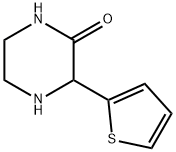Tenilsetam ((+/-)-3-(2-thienyl)-2-piperazinone; Piperazinone, 3-(2-thienyl)- (9CI)), a cognition-enhancing drug successfully used for the treatment of patients suffering from Alzheimer's disease, when included in the Maillard reaction inhibits protein crosslinking by AGEs in vitro. According to the mechanism proposed, Tenilsetam acts via covalent attachment to glycated proteins, thus blocking the reactive sites for further polymerisation reactions. A beneficial effect of Tenilsetam in Alzheimer's disease could come from the interference with AGE-derived crosslinking of amyloid plaques and a decreased inflammatory response by diminished activation of phagocytosing microglia[1].



